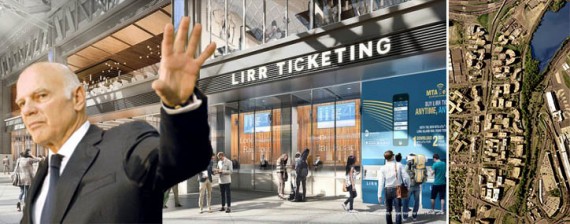Some things seemingly never change at Vornado Realty Trust. A day after announcing the blockbuster spinoff of the real estate investment trust’s Washington, D.C. assets, its 74-year-old CEO Steven Roth once again refused to say whether he had a succession plan in place.
“You’re asking something that’s not answerable at the current time,” Roth said on Tuesday’s quarterly earnings call, after an analyst had asked him whether he would appoint a new chairman or CEO (Roth currently holds both titles).
The call, which went on for almost two hours, was dominated by discussions of the $8.4 billion spinoff, which Vornado’s [TRDataCustom] board approved Monday. Vornado will combine its roughly 70 Washington, D.C. properties with certain D.C. assets held by Maryland-based fund manager JBG Companies under the umbrella of a new public company.
Vornado’s shareholders will receive 74 percent of the new company’s stock, which Roth said will offer them a better return down the line than an outright sale of the properties. “Some are saying that by not selling we are actually buying and that’s sort of true,” he said.
What remains of Vornado after the spinoff, according to the company, will be heavily New York-focused, with an estimated 88 percent of its EBITDA coming from the city (up from a current 70 percent). “At its best, pure New York unburdened by Washington has to trade much better,” Roth told analysts. He argued that comparatively weak performance in Washington’s office market has weighed on Vornado’s stock price in years past, adding an impetus towards the spinoff.
Roth said Vornado first approached JBG about a merger, but talks went nowhere amid disagreements over the new company’s structure. In May, JBG agreed to merge with New York REIT, but the deal was called off in August after failing to win the backing of shareholders. “Maybe the JBG guys stubbed their toes at the NYRT deal, maybe not. Whatever,” Roth quipped.
When talks between Vornado and JBG picked up again, the two parties reached an agreement to turn the merged businesses into a single public company. “We all (…) will worship at the altar of stock price, standing shoulder to shoulder,” Roth said.
Like fellow office REITs SL Green Realty and Boston Properties, Vornado described the New York office market as strong amid stable job growth. The company’s New York president David Greenbaum called a recent 0.5-percentage-point increase in Manhattan office availability “no big deal.” The company expects construction at Farley Station, which it is developing with Related Companies, to begin in 2018.
None of the analysts on the call asked about sales at 220 Central Park South, the REIT’s under-construction luxury condo tower (where Roth functions as something of a bouncer).
Earlier today, The Real Deal published a profile of Roth, his impact on Vornado and what the company could look like when he eventually steps down.
